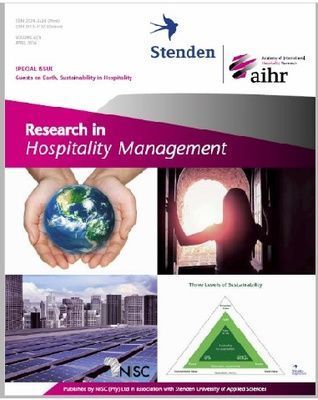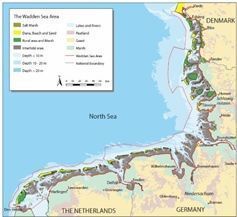
-
 publication: 24 June 2016
publication: 24 June 2016
Special Issue of Research in Hospitality Management on Sustainability By Dr. Sjoerd Gehrels on behalf of RHM Editorial Board
Our latest Research in Hospitality Management journal 6(1)  has been released. Under the leadership of guest editors Professor Elena Cavagnaro – Stenden AIHR, Professor Willy Legrand - IUBH School of Business and Management (Germany), Professor Frans Melissen – NHTV and Philip Sloan - IUBH School of Business and Management (Germany), this is the first issue published Open Access and it is entirely dedicated to sustainability. Open Access allows to reach a wider public and initiates the process of ranking the journal. Part of the editorial is provided here to preview the content of the journal, which will be distributed in hardcopy, through Open Access and on the Stenden AIHR website (www.stendenaihr.com). Sustainability is a highly topical subject and has been so for over twenty years. The same is true of “responsible tourism” and “sustainable hospitality” – concepts which have been discussed and explored by the industry and scientific communities alike. A key issue in these discussions relates to ethics. The term “ethics” goes back to ancient Greek philosophy. However, rather than concluding that this is a tired old theme, it is important to consider the new and continuing challenges which are currently affecting the planet and its populations. This includes economic, political, environmental, and social crises, the impact of which will only increase in years to come.
has been released. Under the leadership of guest editors Professor Elena Cavagnaro – Stenden AIHR, Professor Willy Legrand - IUBH School of Business and Management (Germany), Professor Frans Melissen – NHTV and Philip Sloan - IUBH School of Business and Management (Germany), this is the first issue published Open Access and it is entirely dedicated to sustainability. Open Access allows to reach a wider public and initiates the process of ranking the journal. Part of the editorial is provided here to preview the content of the journal, which will be distributed in hardcopy, through Open Access and on the Stenden AIHR website (www.stendenaihr.com). Sustainability is a highly topical subject and has been so for over twenty years. The same is true of “responsible tourism” and “sustainable hospitality” – concepts which have been discussed and explored by the industry and scientific communities alike. A key issue in these discussions relates to ethics. The term “ethics” goes back to ancient Greek philosophy. However, rather than concluding that this is a tired old theme, it is important to consider the new and continuing challenges which are currently affecting the planet and its populations. This includes economic, political, environmental, and social crises, the impact of which will only increase in years to come.
This special issue features both papers that explore current theoretical approaches, foundations of and critical issues in the study of sustainability in the hospitality industry (study of hospitality) and papers that address specific managerial challenges (study for hospitality). A prime example of the first category is the paper by Lashley that offers the basis for a discussion on the role of ethics as a foundation for sustainability in general and in hospitality in particular. Buijtendijk’s paper critically examines the impact of tourism on the socio-economic and environmental system of  Myanmar by framing the study as a value chain analysis and by assuming a stakeholders’ perspective. Hensens investigates the integration of environmental management practices in hotel classification systems. The eight systems analysed vary greatly in how and to what extent they integrate environmental management practices. Being often small businesses, restaurants have not attracted the attention of researchers as much as hotels. Therefore the approach to sustainability in restaurants is still rather unstructured and lacking scientific evidence. Jacobs and Klosse address this gap by systematically exploring three distinct fields that may support or impede a restaurant in developing a sustainable offer: owner, demand and product. Depke, Lück, Peters, Wellmer and Seidel explore the nexus between product, demand and sustainable value creation in the case of the German region Altes Land. While the paper by Seidel et al. focuses on sustainable value creation through cultural heritage, Folmer, Revier and Cupido examine whether the “World Heritage” status obtained by the Dutch Wadden Sea encourages tourists to approach this natural site differently by choosing to visit it during off-season. Their answer is a qualified no: foreign tourists seem not to opt for an off-season visit while domestic tourist are attracted by the natural beauty of the region but not specially by it having a World Heritage status.
Myanmar by framing the study as a value chain analysis and by assuming a stakeholders’ perspective. Hensens investigates the integration of environmental management practices in hotel classification systems. The eight systems analysed vary greatly in how and to what extent they integrate environmental management practices. Being often small businesses, restaurants have not attracted the attention of researchers as much as hotels. Therefore the approach to sustainability in restaurants is still rather unstructured and lacking scientific evidence. Jacobs and Klosse address this gap by systematically exploring three distinct fields that may support or impede a restaurant in developing a sustainable offer: owner, demand and product. Depke, Lück, Peters, Wellmer and Seidel explore the nexus between product, demand and sustainable value creation in the case of the German region Altes Land. While the paper by Seidel et al. focuses on sustainable value creation through cultural heritage, Folmer, Revier and Cupido examine whether the “World Heritage” status obtained by the Dutch Wadden Sea encourages tourists to approach this natural site differently by choosing to visit it during off-season. Their answer is a qualified no: foreign tourists seem not to opt for an off-season visit while domestic tourist are attracted by the natural beauty of the region but not specially by it having a World Heritage status.
De Brito and Terzieva focus on events. This growing industry more and more recognises that, notwithstanding their short-lived nature, the impacts of events on the environmental and social dimension of sustainability are long lasting. De Brito and Terzieva recognise the industry’s need for a more sustainable approach and on the basis of three case studies of European music festivals propose six key components for designing sustainable strategies for events. There are few theoretical studies covering sustainable Human Resource Management and even fewer looking into rewards and  challenges of applying sustainable HRM in practice. Therefore we are particularly grateful for the contributions by Gehrels and Suleri, and Casey and Sieber because they both address this theme. Casey and Sieber propose an employee-focused process model that can be applied by companies in the hospitality sector to involve employees in sustainability and corporate social responsibility (CSR) issues. Gehrels and Suleri reflect on diversity and inclusion as indicators of sustainable HRM in a case study on an international hotel chain. The authors conclude that, though some steps have been taken, the hotel policy on diversity and inclusivity is still implicit and should be better aligned with the hotel vision and strategy. Van Rheede and Dekker critically examine the current host-guest paradigm in the light of the sustainable challenges facing the hospitality industry. They argue that the current paradigm where the host is pre-eminently preoccupied with pampering and indulging the guest is one of the forces holding hospitality back from a true and fuller engagement with sustainability. Van Rheede and Dekker’s paper can be considered a perfect introduction to the section dedicated to papers presented during the conference organised by AIHR in November 2015.
challenges of applying sustainable HRM in practice. Therefore we are particularly grateful for the contributions by Gehrels and Suleri, and Casey and Sieber because they both address this theme. Casey and Sieber propose an employee-focused process model that can be applied by companies in the hospitality sector to involve employees in sustainability and corporate social responsibility (CSR) issues. Gehrels and Suleri reflect on diversity and inclusion as indicators of sustainable HRM in a case study on an international hotel chain. The authors conclude that, though some steps have been taken, the hotel policy on diversity and inclusivity is still implicit and should be better aligned with the hotel vision and strategy. Van Rheede and Dekker critically examine the current host-guest paradigm in the light of the sustainable challenges facing the hospitality industry. They argue that the current paradigm where the host is pre-eminently preoccupied with pampering and indulging the guest is one of the forces holding hospitality back from a true and fuller engagement with sustainability. Van Rheede and Dekker’s paper can be considered a perfect introduction to the section dedicated to papers presented during the conference organised by AIHR in November 2015.
During this conference, entitled “Guests on Earth”, researchers, students and practitioners met to share their thoughts around the conference theme: the hospitality industry is not only a host but also a Guest on Earth. Fermani, Crespi and Stara represent the academic contribution and consider the role of gender in the choice for a sustainable tourism offer. Interestingly and in contradiction with previous literature, the authors conclude that males are less apathetic towards the environment than females and that in Italy the link between being a citizen and environmental awareness has yet to be built. Peichl and Duursma are both professionally engaged in the industry, respectively as manager at Hilton (Tallinn, Estonia), and owner of De Pleats (a restaurant and party centre in the North of the Netherlands). Peichl shows how theoretical insights can be used to design interventions aimed at inspiring a more pro-environmental attitude in employees. Duursma, with Vrenegoor and Kobus, illustrate the challenges of addressing the issue of food waste in restaurant operations. Driel, Verkade and Vrenegoor describe the design, creation and test of non-alcoholic cocktails as a way to address social responsibility in a restaurant. Finally, Mac Con Iomaire reports on “Food on the Edge”, a symposium initiated by chef, restaurateur, and food columnist J. P. McMahon. The aim of Food on the Edge is to create a benchmark for best practice, in terms of food, its culture, and the people who produce it. Although Food on the Edge was not branded as a sustainability forum, an overwhelming 85% of the presented papers dwelt on  sustainability issues. There is, in the editors’ view, no better proof that sustainability has conquered the attention of the hospitality and tourism industry.
sustainability issues. There is, in the editors’ view, no better proof that sustainability has conquered the attention of the hospitality and tourism industry.




 Back to overview
Back to overview

